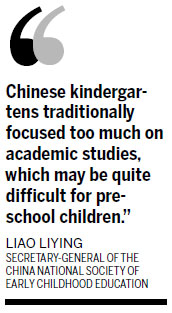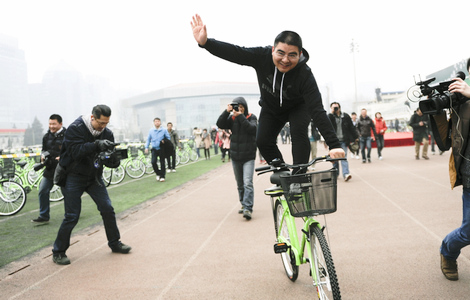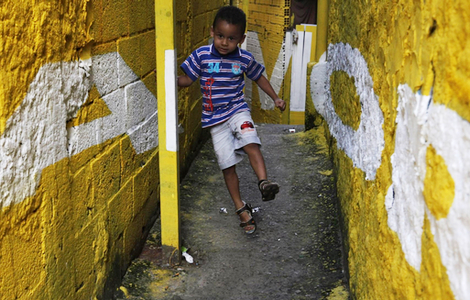Putting child's play back into kindergarten
Updated: 2012-03-02 07:58
By Cang Wei and Song Wenwei (China Daily)
|
|||||||||
NANJING - Five-year-old Zhu Xinyu doesn't like kindergarten. He has to learn Chinese characters, mathematics and a foreign language there.
The boy, who lives in Yangzhou, in East China's Jiangsu province, is reluctant to go to kindergarten every morning. Zhou Wen, his mother, said that she has to spend more than 10 minutes each day trying to cheer him up.
Like Zhu, millions of Chinese children may be reluctant to go to kindergarten. The reason? Academic pressure is to blame.
|
 |
But things are about to change in Jiangsu.
According to regulations that will take effect today, "all the early childhood education that is contrary to the nature of preschool children" will be prohibited, including the reading and writing of Chinese characters and the spelling of foreign-language words.
The regulations also stipulate that interesting activities should be held to inspire children to feel and explore, and to develop their interest and imagination.
"Chinese kindergartens traditionally focused too much on academic studies, which may be quite difficult for preschool children," said Liao Liying, secretary-general of the China National Society of Early Childhood Education.
"In recent years, more children in China have been found to be wary of early childhood programs, with some even feeling afraid of kindergartens," Liao said.
Zeng Fanlin, a professor from the preschool and special education school under East China Normal University, said the regulations of Jiangsu province signify great progress, but more effort should be made by kindergartens to change their educational practices.
"Many foreign countries, such as the United States, have a teaching syllabus for children between 5 and 8," Liao said.
"Instead of tedious learning, it clarifies what children should experience," she said.
"Many Chinese children have given up their personal interest and dreams, after years of great pressure to learn knowledge."
She added that changing elementary schools' teaching methods is key.
"Many teachers of elementary schools don't teach pinyin, the phonetic romanization of Chinese characters and the basis for learning Chinese, to children when they enter school because it's taken for granted that they have acquired it in kindergartens," Liao said.
Parents, however, said they will still ask their children to attend academic courses.
"Even if kindergartens stop giving those courses, we'll send the boy to some private school that offers the courses," Zhou said. "If we don't do so, my son will lag behind other children in terms of academic performance and he'll suffer in the future to catch up with them."
To enter elementary schools, especially some reputable ones, Chinese children have to get high evaluations. Academic subjects count a great deal in this regard.
"Some elementary schools used to ask children to master more than 500 characters in kindergartens," Zeng said.
Liao said that she had seen textbooks for elementary schools on children's desks in some kindergartens, which are considered to be the best in Beijing.
"A large proportion of Chinese parents will send their children to private schools if kindergartens stop teaching the knowledge demanded by elementary schools," Liao said.
There are staff members from private schools handing out leaflets in front of many Chinese kindergartens.
Wu Yuchun, the headmaster of a private school in Huai'an, Jiangsu province, said that he is considering running classes for preschool children.
"My institution has been providing services to students aged above 6 for more than 10 years, but now it's time to make a change. And I have to say that this is a great business opportunity for private schools," he said.
"The whole society puts too much emphasis on scholastic success. Children exploring the outside world and feeling natural beauty are more important," Liao said. "If elementary schools don't change their entrance requirements and teaching methods, the regulation to ease preschool children's pressure will no doubt end in failure."
According to China's Ministry of Education, by 2009 the country has 138,000 kindergartens, which provide service to 26.6 million children.
Hot Topics
Wu Ying, iPad, Jeremy Lin, Valentine's Day, Real Name, Whitney Houston, Syria,Iranian issue, Sanyan tourism, Giving birth in Hong Kong, Cadmium spill, housing policy
Editor's Picks

|

|

|

|

|

|







